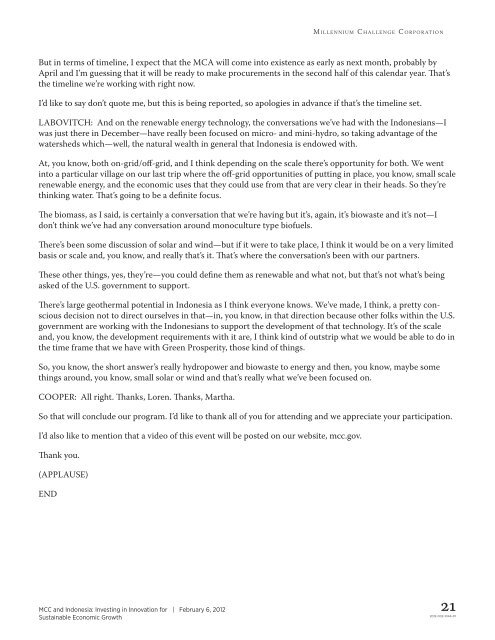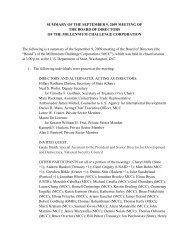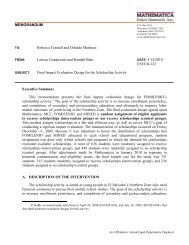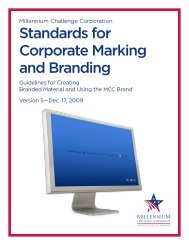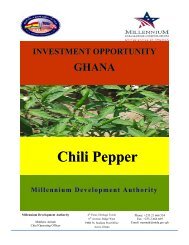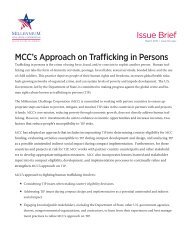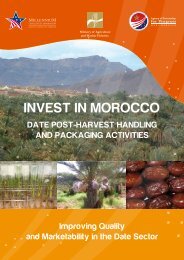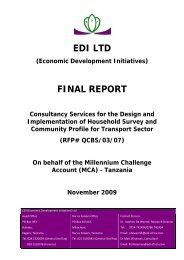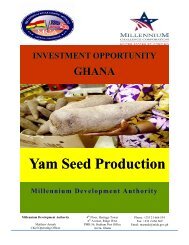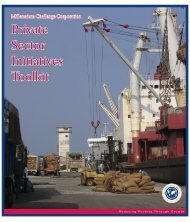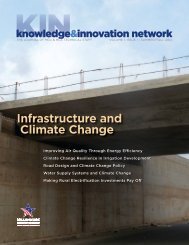Transcript - Millennium Challenge Corporation
Transcript - Millennium Challenge Corporation
Transcript - Millennium Challenge Corporation
Create successful ePaper yourself
Turn your PDF publications into a flip-book with our unique Google optimized e-Paper software.
But in terms of timeline, I expect that the MCA will come into existence as early as next month, probably by<br />
April and I’m guessing that it will be ready to make procurements in the second half of this calendar year. That’s<br />
the timeline we’re working with right now.<br />
I’d like to say don’t quote me, but this is being reported, so apologies in advance if that’s the timeline set.<br />
LABOVITCH: And on the renewable energy technology, the conversations we’ve had with the Indonesians—I<br />
was just there in December—have really been focused on micro- and mini-hydro, so taking advantage of the<br />
watersheds which—well, the natural wealth in general that Indonesia is endowed with.<br />
At, you know, both on-grid/off-grid, and I think depending on the scale there’s opportunity for both. We went<br />
into a particular village on our last trip where the off-grid opportunities of putting in place, you know, small scale<br />
renewable energy, and the economic uses that they could use from that are very clear in their heads. So they’re<br />
thinking water. That’s going to be a definite focus.<br />
The biomass, as I said, is certainly a conversation that we’re having but it’s, again, it’s biowaste and it’s not—I<br />
don’t think we’ve had any conversation around monoculture type biofuels.<br />
There’s been some discussion of solar and wind—but if it were to take place, I think it would be on a very limited<br />
basis or scale and, you know, and really that’s it. That’s where the conversation’s been with our partners.<br />
These other things, yes, they’re—you could define them as renewable and what not, but that’s not what’s being<br />
asked of the U.S. government to support.<br />
There’s large geothermal potential in Indonesia as I think everyone knows. We’ve made, I think, a pretty conscious<br />
decision not to direct ourselves in that—in, you know, in that direction because other folks within the U.S.<br />
government are working with the Indonesians to support the development of that technology. It’s of the scale<br />
and, you know, the development requirements with it are, I think kind of outstrip what we would be able to do in<br />
the time frame that we have with Green Prosperity, those kind of things.<br />
So, you know, the short answer’s really hydropower and biowaste to energy and then, you know, maybe some<br />
things around, you know, small solar or wind and that’s really what we’ve been focused on.<br />
COOPER: All right. Thanks, Loren. Thanks, Martha.<br />
So that will conclude our program. I’d like to thank all of you for attending and we appreciate your participation.<br />
I’d also like to mention that a video of this event will be posted on our website, mcc.gov.<br />
Thank you.<br />
(APPLAUSE)<br />
END<br />
MCC and Indonesia: Investing in Innovation for | February 6, 2012<br />
Sustainable Economic Growth<br />
21<br />
2012-002-1044-01


